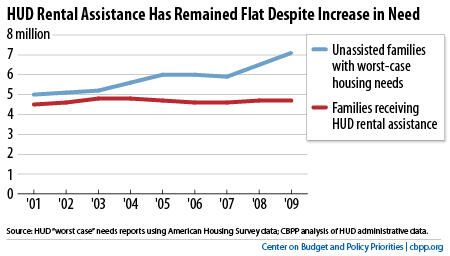BEYOND THE NUMBERS
Rental Assistance Reforms Would Build on Existing Programs’ Successes and Save Money
Testifying today before the Senate Banking Subcommittee on Housing, Transportation, and Community Development, Will Fischer, the Center’s senior policy analyst who focuses on federal low-income housing programs, explained that the proposed Affordable Housing and Self-Sufficiency Improvement Act (AHSSIA) and Section 8 Voucher Reform Act (SEVRA) would strengthen the voucher program and other major rental assistance programs, which help more than four million low-income households afford decent housing.
Yet, rental assistance remains hard to come by. Just one in four eligible low-income families receives it due to limited funding for the existing programs, and the need has increased significantly in the last decade. The number of families struggling to afford rental costs has grown, but the number receiving rental assistance has not kept pace (see chart).

“The reforms in these bills would sharply reduce administrative burdens for state and local housing agencies and private owners, establish voucher funding rules that would enable housing agencies to manage funds more efficiently, strengthen work supports, and generate large federal savings,” Fischer told the subcommittee.
His testimony focused on seven core reforms that should receive top priority for enactment:
- Simplify rules for setting tenant rent payments, while continuing to cap rents at 30 percent of a tenant’s income;
- Streamline voucher housing quality inspections to encourage private owners to participate in the program;
- Establish a stable, fair voucher funding system to enable agencies to use funds more efficiently and better cope with shortfalls;
- Allow more working poor families to qualify for vouchers by modestly raising income targeting limits;
- Strengthen the Family Self-Sufficiency program, which offers housing assistance recipients job counseling and incentives to work and save;
- Provide added flexibility to “project-based” vouchers to support affordable housing development and preservation;
- Make the rental assistance admissions process fairer by limiting screening to criteria related to suitability as a tenant.
“Reforms that stretch limited dollars to assist more families or avoid painful cuts are especially urgent today, when budgets are tight but unemployment, poverty, and homelessness are high,” Fischer said. “The core provisions of AHSSIA and SEVRA would build on the voucher program’s many strengths through a series of measured, targeted improvements that, taken together, would deliver important benefits to housing agencies, private owners, and low-income families.”
Click here for the full testimony.
